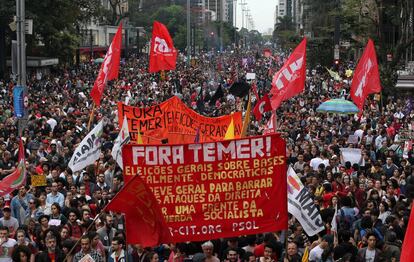Thousands march against new government in Brazil
Crowds fill Avenida Paulista in Sao Paulo in protest against country’s new president, Michel Temer


Thousands of people on Sunday filled Sao Paulo’s Avenida Paulista, a major thoroughfare in Brazil’s largest city, to protest against the newly sworn-in president Michel Temer and his administration.
While the new Brazilian president had dismissed previous protests as “small groups of 40 to 100 people,” on Sunday 100,000 angry citizens marched against his government, which rose to power only after elected President Dilma Rousseff was ousted from office through an impeachment process.
Children, youngsters and elderly people joined the demonstration organized by the left-leaning coalitions Popular Front of Brazil and People Without Fear. By 6pm, Avenida Paulista was packed. The crowd then walked the nearly five kilometers to Plazoleta de la Patata, a square that has become the meeting place for leftist street movements.
As the other side grows, it is becoming more important to take a position
Daniela, protesting schoolteacher
According to six EL PAÍS reporters who were posted in different areas during the march, the rally proceeded without incident from 4.30pm until 8.45pm local time, when protestors filled the square. Then, to everyone’s surprise, the police arrived and dropped tear gas outside and inside Faria Lima metro station. People took refuge inside bars. Members of the press were attacked. Marina Rossi reported that photographer Mauricio Camargo was hit with a rubber bullet. A BBC Brazil journalist was beaten with a nightstick even though he was clearly identified as a member of the press.
The police said they attacked the metro station because vandals provoked them. The first smoke bombs were used after a group started to shout: “Free the turnstile!” They were asking authorities to give people from the suburbs a free pass into the city. Critics note that turnstiles were unlocked during past demonstrations against Dilma Rousseff.
Shortly after the incident at Farina Lima, the police said on Twitter: “The actions of a few vandals forced officers to intervene with moderate use of force and chemical ammunition during a demonstration that started out peacefully.” And at 10.45pm local time, the Security Secretariat published a statement that described some kind of commotion at the station. “The vandals destroyed the turnstiles and put the lives of government employees at risk,” it said. Marina Novaes, who was present on Sunday, said that she did not see any property being destroyed. Another 15 witnesses interviewed by EL PAÍS told the same story.
But that is not to say that people were not angry. The atmosphere became especially heated after Temer played down the importance of previous protests. “That showed a lack of respect,” said Rodrigo, a government worker. Daniela, a school teacher, and Rodrigo recognized several faces in the crowd that had not defended the former president during her impeachment process.
Sign up for our newsletter
EL PAÍS English Edition has launched a weekly newsletter. Sign up today to receive a selection of our best stories in your inbox every Saturday morning. For full details about how to subscribe, click here.
“As the other side grows, it is becoming more important to take a position,” Daniela said. Like them, most of the demonstrators were not affiliated with any party and they had voted for Dilma Rousseff in 2014. Rodrigo and Daniela sang the slogans of their own movement: “Out Temer,” and “General Elections Now.”
It is not imperative that former President Rousseff return to power, several protestors explained. But they want elections, they said, because it is the best way to recover the right to choose.
English version by Dyane Jean François.
Tu suscripción se está usando en otro dispositivo
¿Quieres añadir otro usuario a tu suscripción?
Si continúas leyendo en este dispositivo, no se podrá leer en el otro.
FlechaTu suscripción se está usando en otro dispositivo y solo puedes acceder a EL PAÍS desde un dispositivo a la vez.
Si quieres compartir tu cuenta, cambia tu suscripción a la modalidad Premium, así podrás añadir otro usuario. Cada uno accederá con su propia cuenta de email, lo que os permitirá personalizar vuestra experiencia en EL PAÍS.
¿Tienes una suscripción de empresa? Accede aquí para contratar más cuentas.
En el caso de no saber quién está usando tu cuenta, te recomendamos cambiar tu contraseña aquí.
Si decides continuar compartiendo tu cuenta, este mensaje se mostrará en tu dispositivo y en el de la otra persona que está usando tu cuenta de forma indefinida, afectando a tu experiencia de lectura. Puedes consultar aquí los términos y condiciones de la suscripción digital.








































